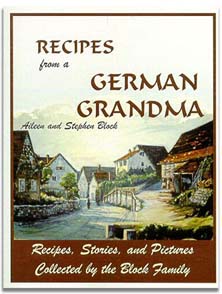Directions:
Cook zucchini, onion and broth in a saucepan over medium heat until very soft. When pierced with a fork , the fork will enter the vegetables effortlessly.
Puree contents of saucepan in blender. Add ground pepper, half and half or yogurt and blend again.
Serve warm from the blender or chilled. If storing soup in the refrigerator, reheat to UNDER the boiling point to serve. If the soup is boiled with the cream in it, the soup will curdle.
Of course you don’t have to use “College Inn” brand, you can use any brand or home made broth. Don’t add salt if you're using commercial canned broth which is very salty.
This soup can be frozen BEFORE adding the cream. Thaw, reheat, add cream, stir and serve. Do NOT boil soup once cream is added.
This soup is fast and easy but still qualifies as “home made”. Just tuck those two empty cans under the bottles and tins in the recycling bin and no one will ever know!

Chef Andreas And The Mystery Of The “Long Green Things”
from Karen Kinnane
Ariane’s cousin Andreas trained as a chef under the Communist regime in East Germany. Years later after the defeat of Communism and German reunification he bemoaned to me the fact that the isolation from Western civilization due to the Communist borders had stunted the development of German cuisine. Andreas is not very complimentary about German food. I’m a good guest and listen to his theories but in my head I defend German cooking as much of it is excellent.
When Ariane and I visited Andreas and his wife in their fifth floor walk up in Dresden, he prepared a wonderful soup which he called “Jewish chicken soup” I thought that was an interesting choice in a country which had attempted to annihilate all Jews within the German borders and out of them. But that all happened before Andreas was born so he did not see the irony. Andreas served the soup at the table in a huge blue and white pottery turine (Have to check spelling, this does not look correct and spell check is no help!), ladling it into matching blue and white soup bowls. His soup was delicious, the presentation beautiful. The food, company and conversation could not have been better in the finest restaurant in Dresden.
During lunch Andreas talked about the difficulties of training as a chef and working as a chef under the Commies. He spoke of the chronic and widespread shortages under Communism, and indeed under all Socialist / Communist regimes as Communism results in the equal spread of shortage and misery while Capitalism results in the unequal distribution of wealth but the availability of goods from all over the world.
Andreas spoke of the difficulty of preparing any interesting or exciting dishes with the simple ingredients available for sale in Germany and Russia under the Commies.
He complained of the limited palette of root vegetables, cabbages, beef, chicken and pork. He began to tell me that he had been stumped by the inability to get any of those “wonderful long green things” for cooking. And indeed it appeared that his inability to acquire those “wonderful long green things” for cooking was a major reason for his quitting his chef career and going off to become an actor. As we chatted, and he continued to mention the absence of the “wonderful long green things” under the Soviets I wracked my brain to think of about what magnificent food he was talking! I could not imagine. Finally the light went on and I burst out, “Andreas, you don’t mean zucchini, do you?” The mystery was solved! Under Communism there was no access to zucchini in Germany! No wonder the wall went down!
I told Andreas that under capitalism in America, the sight of your neighbor coming down your front walk with an armload of zucchini in garden season was considered sufficient and justifiable reason to draw the blinds and have the butler answer the door claiming the family was on holiday and not likely to return for six weeks. Actually most Americans don’t have butlers, but the sight of a neighbor heading towards us with a bushel of zucchinis is not always welcome!
Product Links and more Recipes
|






.jpg)
